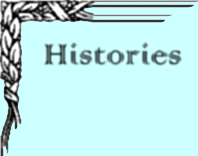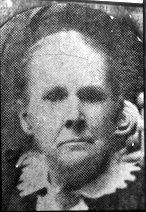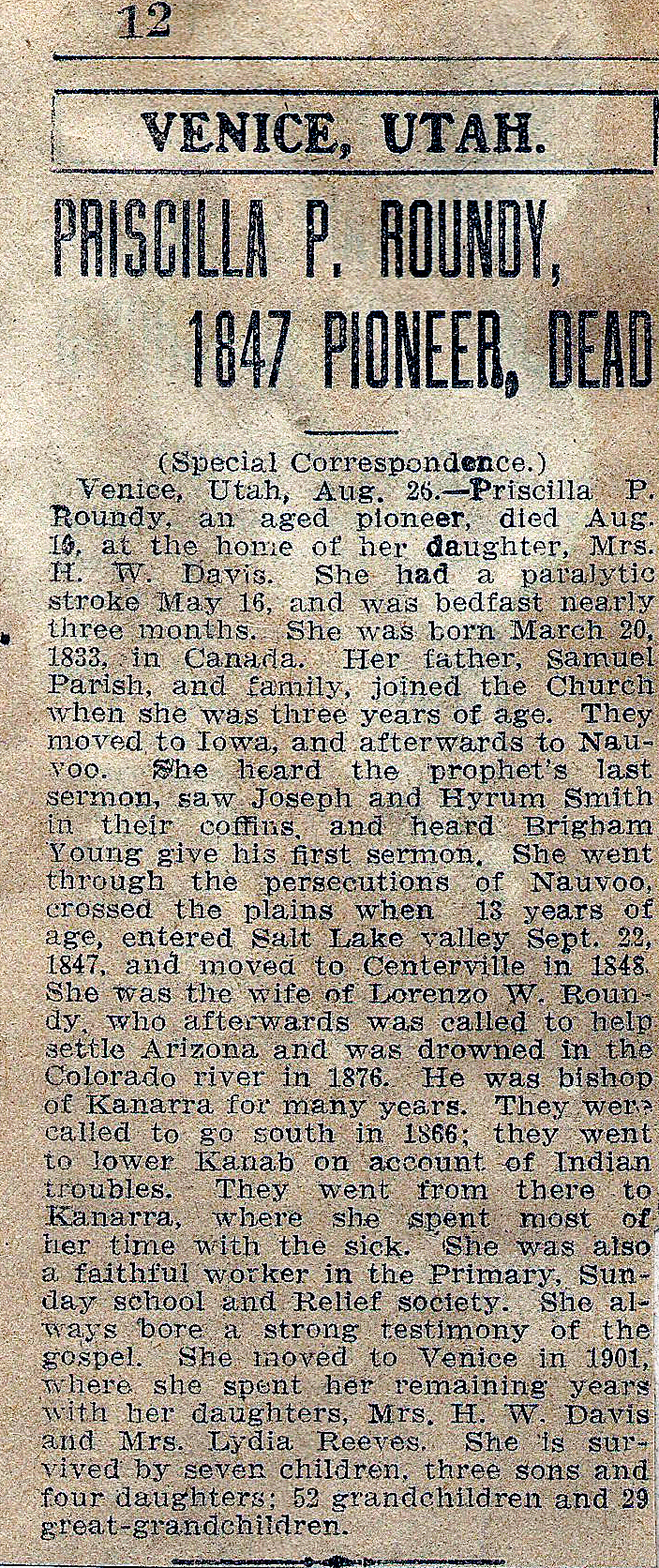
Histories
A history of Priscilla ParrishHome
Histories - - >
Charts
Photos
Maps
Restricted
News
Info
Contact

Note: Her name is sometimes spelled Prisella. Parrish is sometimes Parish.
Her father was born in Canada, her mother was born in Ireland. Canada was a very cold place, they had to dig up trees to make room for farming land.
(The following is told in her own words.)
My grandparents on my father's side were Quakers. I am unable to tell what my grandparents were on my mother's side. Their names were William and Jane Dack.
It was so cold in Canada that the snow laid on the ground six months of the year. My father became dissatisfied and moved to Star County Illinois.
Although he had never seen a Mormon elder, he purchased a Book of Mormon when he left Canada. Illinois proved to be a good place to make a living. He had a large farm and a fine orchard.
Grandfather and Grandmother Parrish were living with us at the time and it was at this time that we first heard a Mormon Elder. My father, mother and four sisters joined the church. My brother joined it in the winter, when they had to cut the ice in order to baptize him.
We did not have to raise hay in Illinois. They went out on the prairie and cut their hay. After father joined the Church he went to Nauvoo to see the Prophet Joseph Smith. My two oldest sisters married here. Soon after this, they joined the Church and got the spirit of gathering, so we moved to Iowa, across the river from Nauvoo. We all moved except Mary, my youngest sister.
There was a branch of the Church here. I went to school for a while, but after a short time, we moved again down on the bottoms near Nauvoo.
Mary moved to Iowa. We lived near her for a while, then moved out on the prairie. While we were living here my sister Sarah died, and Mother took her child, age 2 1/2 years old then. Soon after, we had a large prairie fire, and had to burn grass around our house in order to save it.
About this time, we moved to Nauvoo, and lived on the banks of the river. Nearly all the families had chills and fever, then the measles. My sister Mary died with measles and left a baby girl.
After this, we moved up into town and I had the chills and fever. I was eleven years old at the time and the Prophets Joseph and Hyrum Smith were killed at Carthage jail. I will never forget that sad time, everything seemed o'er shadowed with gloom. I was baptized in the Mississippi river about this time. I saw the Prophets after they were laid in their caskets.
My father and brother Joel were working on the temple at that time. I had the privilege of hearing the Prophet preach his last sermon. I can testify that he was a Prophet of the Lord, for the benefit of my children. The enemies were not satisfied with killing the Prophets, they burned homes and grain all around them.
My sister Lydia married Joseph Cod. They lived on the house we had, but soon separated.
In the spring of '46, we had to leave our beautiful city and temple. We crossed the Mississippi river, camped on the banks of Iowa a few days, then we moved about six miles to my sister Lydia's place. It was a while here that my sister Lydia died in the night. She was sleeping in the wagon, complained of her head and soon died. As there were no carpenters there, Father had to make her a casket, and we buried her there. My grandfather, grandmother and three sisters lay side by side in the Montrose graveyard.
I was two years old when Grandmother Dack died, so I don't know very much about her.
We travelled on as far as Phirggel, a stopping place for a short time. We put in a garden there and it was almost ready to use when Father thought we had better go on to the Missouri River. We wanted to cross the river, but were unable to just there, so we went up a ways and camped on the banks of the river.
Brother Henderson and our folks built some log houses. We couldn't get any grinding done so we lived for some time on hominy and ground corn, ground in a coffee mill. There were also wild grapes that we ate.
The Indians visited us quite often, they had to cross the river on the ice. They killed a cow for us, and an ox for Brother Henderson, and in the spring, they threatened to turn us out so we moved up to a lake where there was a small settlement.
My brother planted some wheat. Father thought we could not come to the valley that year, as we only had three oxen, but he traded some food for an ox which a widow owned. We had some sheep which we sheared and sold. We corded and spun the wool before we started to the valley. I was then 14. My father and brother drove a team for James Pollock. Mother and myself walked and drove the cows. The first buffalo we saw was killed by Parley Pratt Rickardson. We saw many buffalo afterwards. We travelled along the Platte River. When wood was scarce, we burned buffalo chips.
The Sioux tribe of Indians visited us often. They were a fine looking tribe. We had to camp often to rest our teams and wash clothes. We made a corral of the wagons. We had to keep close to the wagons for fear of the Indians. We did not know just where we were going until we met the first Pioneers coming back from the valley. We were camped on the bank of the Platte River when we heard a herd of buffalo coming down to drink. They would have run through the camp but the men shot at them. The women shouted and they went by, just missing the wagons. If they had gone through the camp, they would have destroyed all we had and killed many people.
Sometimes we had Indian alarms and the men would go ahead but most of the time it would prove to be prairie dogs.
I had mountain fever at this time. There were six days that I didn't keep anything on my stomach, and had to walk most of the time and drive cows. Mother got some whiskey and gave it to me clear and it broke up my fever and cured me. My father then came down with it and was sick two weeks. Mother couldn't drive the oxen so I drove them and she drove the cows, until father got well.
We arrived in the valleys of the mountains Sept. 22, 1847. We moved down in the valley near City Creek. Father and Joel made adobes and built us a room. We thought for a while we would have to winter in the Black Hills but the Lord blessed us and did not let our enemies drive his people into the wilderness to perish. I feel to acknowledge His hand in preserving us from our enemies, also in crossing the plains and barren deserts, where so much danger lay.
The valley soon blossomed as a rose through our efforts. President Young said the Lord would bless it for His people, and if the enemies drove us away, He would curse it for them. We were very thankful when we reached a resting place. Our house was covered with willows and dirt, so when it rained, it leaked badly.
The fort was built in a square with four large gates. We had smaller gates to go through to our corrals. It was a solid wall on the outside, arranged to shoot through if Indians molested us, but they were quite peaceable.
The Lord greatly blessed us that winter. We had very little snow so our cattle did not suffer, for we had nothing to feed them. We had a few chickens. My brother trapped wolves and Mother cooked them for the chickens. We finally had to kill two of our oxen in order to have meat to live on, so that left us with one yoke.
The young folks used to have some good times. We used to have plays and dances on the dirt floor. A man by the name of Levi Hancock played the violin for the dances.
In the spring we moved out east by Emigration Canyon where our land was. We built a dugout and lived there during the summer. We had to live on rations that year. We had two pints of corn meal a day for five people. We had five cows giving milk. We didn't have much use for butter, as we made corn meal gruel for breakfast and the same for dinner. Sometimes we had thistle roots and sego lily roots, wild onions, grees [greens?], or milk straight for supper. We lived in this way for 3 months, until harvest time. We also had a nice garden, and when it was all up and doing fine, the crickets came along. We had to fight them off from daylight until dark. We went through the wheat with a brush and knocked them off. We cut some of the wheat with a cradle, and some with a cycle [sickle]. Mother and I cut the heads off [with] a case knife, put them in a basket, and threshed it with a flail, which is two sticks tied together.
President Brigham Young put up a mill without any bolts. We had our wheat ground into bran and it was the best bread I ever ate. This lasted until the cord was ripe, then we lived on corn the rest of the year.
My brother belonged to the battalion, so he left the crops to father. We had to go the field every day. I had to ride on a dragoon saddle. Mother gave me some gruel in a coffee pot for my dinner, so as not to waste any. There was a ditch on one side of the field, and a creek on the other. I would stake my horse and go back and forth along the ditch and kill all the crickets I could see. I had to go every day until we harvested. We raised 40 bushels of turnips that fall.
We then moved 12 miles north of Salt Lake and lived in a tent. A man there put in a patch of corn which was too late to mature, so father made molasses from it and we lived on corn bread and molasses for a long time.
Father and Joel built us a log cabin, which we lived in that winter. The boy that lived with us had his thumb taken off in the mill. We added two rooms onto our house.
They took up some land in the spring and put in their crops. When the wheat was up, the crickets came and it looked like they were going to take everything before them, but before they had done much damage, the seagulls came from great Salt Lake and ate them up and kept eating until there were none left, so we didn't have to fight crickets that spring. The Lord prepared the way to fight them for us. We raised some bread stuff that year.
My brother Joel went to California to the gold mines. When he started across the creek, my mother went across and shook hands with him, the second time. She never saw him again, as she died while he was gone. He helped put in the crops before he left. That fall I helped stack all the grain, and the next year we rented the farm out.
Mother and I took some wool, corded and spun it on shares, and had it woven into cloth. We got it home just two days before Mother died. She was only sick four days. She had congestive chills. I had the trisseples when she died. Brother Joel came home two weeks afterwards. There was a family came from the states and lived with us that winter, by the name of Bowen. I kept house and made Mother's share of lindsay for father, and had enough for me [for] two dresses.
(Finished by granddaughter Jennie Davis Cowley)
They moved to Centerville in 1848. She was married as [the] third wife to Lorenzo Wesley Roundy, on April 22, 1857. They were called in 1866 to go south to help settle the country. They first went to Kanab. On account of Indian trouble they moved to Kanarra, where her husband was bishop for many years. She spent most of her life at Kanarra taking care of her family. Her husband was called to go and help settle Arizona and was drowned in the Colorado River in 1876. She was left a widow with seven children to care for. She spent a great deal of her time with the sick, and was always willing to help those in need.
While at Kanarra, she made all her children's hats, spun and wove her own cloth to make their clothes and also made most of the children's shoes. She didn't have much means to go on and it was often very hard to get along. But the Lord blessed her and her family, so while they didn't have many luxuries, they did not suffer greatly.
She was president of the Primary for 17 years, and also worked in the Sunday School and Relief Society.
She moved to Venice, Sevier County in 1901, where she spent the remainder of her life. Annie I Davis and Lydia Reeves.
She had a stroke on May 16, was bedfast for three months, and died at the home of her daughter Annie I. Davis, on August 10, 1914.
She spent a good deal of her later life working [in] the Temple. She worked for 50 names of her own besides much work for charity.
Children of Lorenzo Wesley and Priscilla Parrish Roundy: Fanny Jane, Sarah, Samuel H., Joel Jesse, Annie Isadore, David Alonzo (who died in infancy), Lydia Annis and Heber Lorenzo.
Typed in by Joseph F. Buchanan - 14 June 1996, minor corrections 10/10/96
